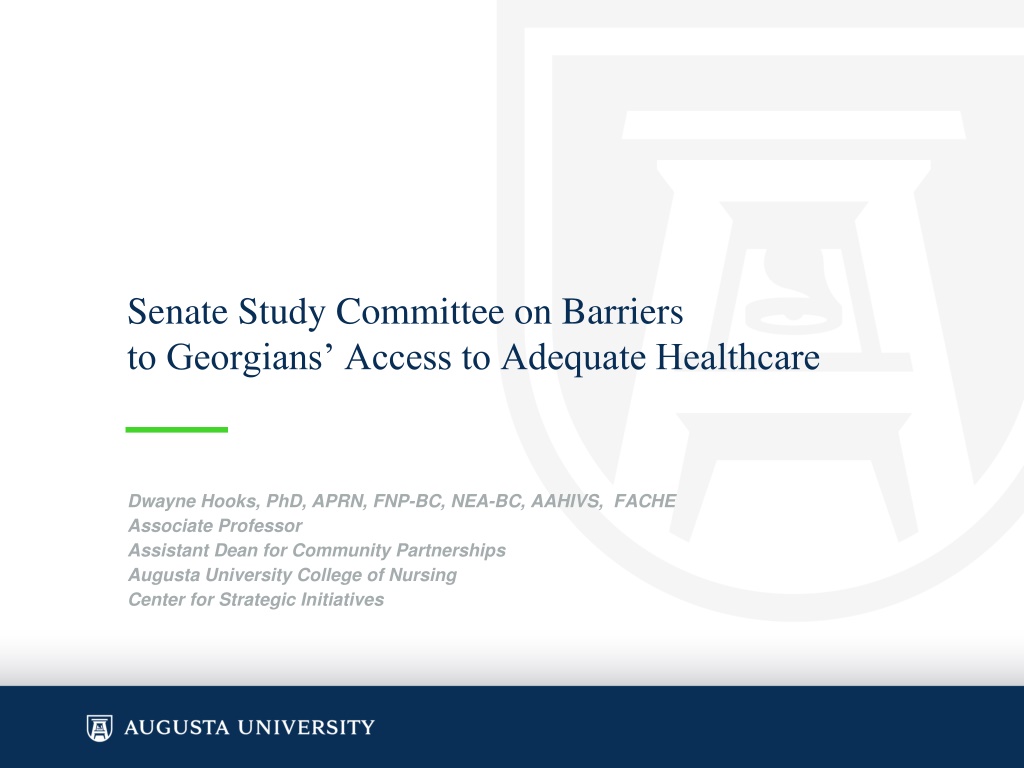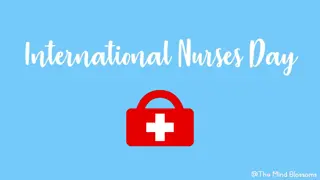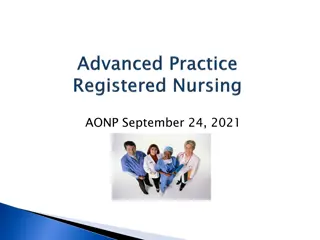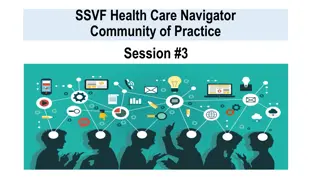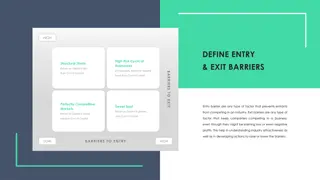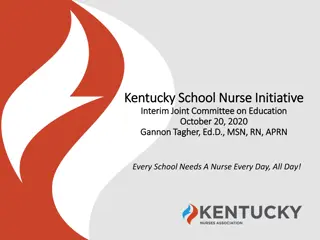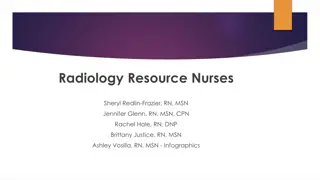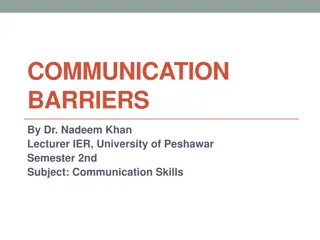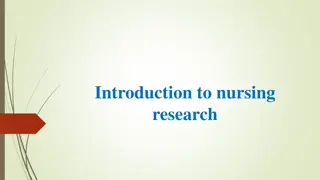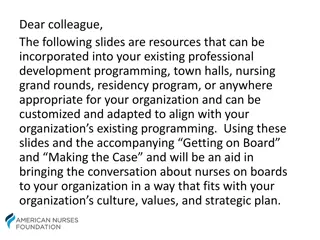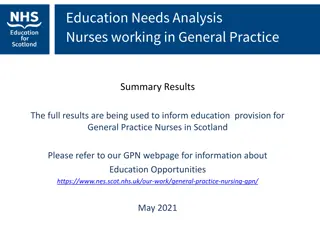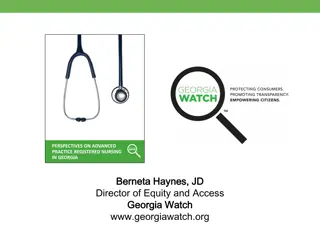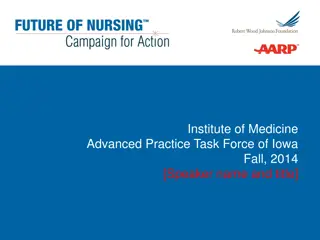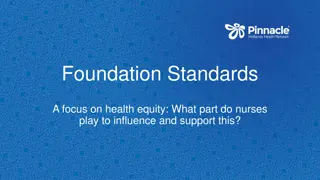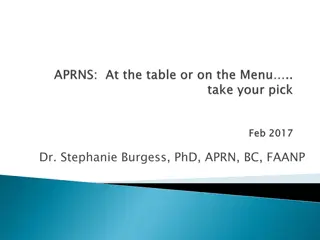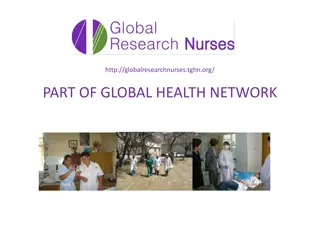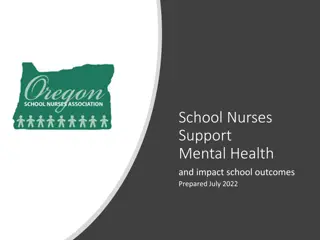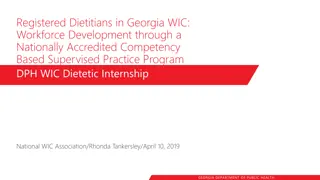Addressing Barriers to Advanced Practice Registered Nurses in Georgia
Georgia is facing a critical shortage of healthcare providers, and there is a need to remove restrictions on Advanced Practice Registered Nurses (APRNs) to meet healthcare needs. This includes confusion around laws regulating APRNs with prescriptive authority, such as nurse protocol agreements and restrictions on ordering specific tests and prescribing medications. Terms related to delegating physicians in nurse protocol agreements pose additional barriers that need to be addressed to improve access to healthcare in Georgia.
- Healthcare
- Georgia
- Advanced Practice Registered Nurses
- Nurse Protocol Agreements
- Healthcare Providers
Download Presentation

Please find below an Image/Link to download the presentation.
The content on the website is provided AS IS for your information and personal use only. It may not be sold, licensed, or shared on other websites without obtaining consent from the author. Download presentation by click this link. If you encounter any issues during the download, it is possible that the publisher has removed the file from their server.
E N D
Presentation Transcript
Senate Study Committee on Barriers to Georgians Access to Adequate Healthcare Dwayne Hooks, PhD, APRN, FNP-BC, NEA-BC, AAHIVS, FACHE Associate Professor Assistant Dean for Community Partnerships Augusta University College of Nursing Center for Strategic Initiatives
What we know Global shortage of healthcare providers Georgia faces a critical shortage Georgia s overall healthcare ranking compared to other states needs to improve New healthcare delivery models are needed to meet care needs Many solutions exists One solution: Remove restrictions on Advanced Practice Registered Nurses, Physicians Assistants, Dental Hygienists, and other healthcare providers ability to practice to the fullest extent of their education, certification, and licensure
Barriers that Advanced Practice Registered Nurses face in Georgia Advanced Practice Registered Nurses with prescriptive authority are regulated by the Georgia Board of Nursing and the Georgia Composite Medical Board (GCMB) Confusion exists regarding the two laws regulating Advanced Practice Registered Nursing APRNs with prescriptive authority1 are required to have a nurse protocol agreement approved by the GCMB APRNs without prescriptive authority2 are not required to have a nurse protocol agreement approved by the GCMB If the Advanced Practice Registered Nurse has prescriptive authority1, restrictions are placed on their ability to order certain radiological tests (MRI, CT, PET, & nuclear medicine scans) unless in life-threatening situations Restrictions on prescribing Schedule II medications 1OCGA 43-34-25 2OCGA 43-34-23
Barriers that Advanced Practice Registered Nurses face in Georgia Terms related to delegating physician and designated physician in nurse protocol agreements are often not well understood Rules and regulations exist that require: Medical record review by the delegating physician Ten percent of all patient medical records All patient medical records who were prescribed a controlled substance All patient medical records where an adverse outcome occurred Delegating/Designated physician must be accessible at all times when the Advanced Practice Registered Nurse is working The nurse protocol agreement terminates when the delegating physician leaves the practice
Removing Barriers for Advanced Practice Registered Nurses Removing barriers that restrict Advanced Practice Registered Nurses from practicing to the full extent of their education, certification, and licensure is not a novel idea 22 States and the District of Columbia have removed restrictive language from legislation and regulations and allow for full practice authority Veterans Health Administration Indian Health Service
Research on Advanced Practice Registered Nurse Care Kurtzman et al. (March 2017) No statistically significant differences in quality were detected in states that allowed full practice authority Collaborative Agreements were not necessary to create APRN to MD referrals NP visits in states with [full practice authority] had a higher odds of physician referrals than those in restricted states Kurtzman and Barnow (June 2017) Visits to nurse practitioners and physicians assistants received similar quality, services, and referrals as those [visits] made to physicians
Research on Advanced Practice Registered Nurse Care Advanced Practice Registered Nurses in primary care settings performed as well as physicians Multiple studies have shown that Nurse Practitioners provide high-quality care (Rudner & Kung, 2017) Advanced Practice Registered Nurses demonstrated equal or better outcomes for: Physiologic measures Patient satisfaction Cost (Swan, Ferguson, Chang, Larson, & Smalldone, 2015)
Recommendations from previous SR188 Presentations Public Health Department Has a presence in all counties Telehealth/Telemedicine Hometown Health Telehealth/Telemedicine Move to full practice authority Georgia Nursing Leadership Coalition Reconceptualization of roles for nursing Nurses leading change Georgia Board of Physicians Workforce Increase number of physicians and healthcare practitioners in underserved rural areas Discussed loan repayment Augusta University College of Nursing Rural outreach, funded grants, research in rural areas, N-PEP Non-profit organization and academic institution partnerships
Recommendations from previous SR188 Presentations Medical Associates Plus Federally Qualified Health Centers (supportive of scope of practice reform) Center for Rural Health Support & Study Telemedicine, Healthcare/Hospital Board Education (supportive of scope of practice reform) Elizabeth Downes, DNP, MPH, APRN, FNP-BC, CNE, FAANP, ANEF, FAAN (Emory University Nell Hodgson Woodruff School of Nursing) Discussed need for nurses with practice doctorates Georgia Department of Community Health Rural Health Stabilization Committee Increased use of APRNs in extended hours clinic Carolyn Clevenger, DNP, APRN, AGPCNP-BC, GNP-BC, FAANP (Emory University Nell Hodgson Woodruff School of Nursing) Discussed seven barriers limiting advanced practice nurses from employing practice innovations
National Entities supporting Full Practice Authority for Advanced Practice Registered Nurses Institute of Medicine National Governors Association Bipartisan Policy Center American Enterprise Institute Josiah Macy Foundation The Heritage Foundation American Association of Retired People Federal Trade Commission Veterans Health Administration Robert Wood Johnson Foundation National Council of State Boards of Nursing American Association of Nurse Practitioners American Hospital Association (Fauteux, Brand, Fink, Frelik & Werriein, 2017; Rudner & Kung, 2017)
Additional Benefits Full Practice Authority for Advanced Practice Registered Nurses has more than just the benefit of increased access to healthcare services and the potential for improved health Positive economic impact Favorable for increase in related jobs Increase in state revenue secondary to income and occupational taxes Downstream positive financial impact from related business
The APN workforce is well positioned to provide safe and effective primary care (Swan, Ferguson, Chang, Larson, & Smalldone, 2015)
Recommendations 1. Reform scope of practice allowing full practice authority for Advanced Practice Registered Nurses, Physicians Assistants, and other licensed healthcare professionals 2. Adopt the National Council of State Boards of Nursing Model Nurse Practice Act and Model Nursing Administrative Rules 3. Allow for Advanced Practice Registered Nurses to prescribe Schedule II medications 4. Support innovation in healthcare delivery models within Georgia including funded demonstration projects 5. Support Advanced Practice Registered Nurses in leading patient-centered team-based models of care such as the Primary Care Home Model
Recommendations 6. Reform insurance laws to allow patients to choose an Advance Practice Registered Nurse as their primary care provider and have that care reimbursed 7. Support the preceptor tax incentive program allowing Advanced Practice Registered Nurses to receive tax incentives for precepting 8. Expand loan repayment for Advanced Practice Registered Nurses practicing in underserved areas 9. Provide for scholarship funding for Advance Practice Registered Nursing Students who desire to work in underserved areas 10. Build optimal statewide infrastructure to support telehealth hub and spoke model of care
Questions Contact Information: Dwayne Hooks, PhD, APRN, FNP-BC, NEA-BC, AAHIVS, FACHE Associate Professor Assistant Dean for Community Partnerships Augusta University College of Nursing Center for Strategic Initiatives 706-721-3290 (office) jhooks@augusta.edu
References Fauteux, N., Brand, R., Fink, J., Frelick, M. & Werriein, D. (2017). The case for removing barriers to APRN practice. In M. Ladden (ed.), Charting Nursing s Future (pp. 1-10). Princeton, NJ: Robert Wood Johnson Foundation. Georgia Composite Medical Board. (2015). Frequently asked questions regarding Nurse Practitioners and protocol agreements. Available at: https://medicalboard.georgia.gov/sites/medicalboard.georgia.gov/files/related_files/site_ page/APRN_FAQv%20082015.pdf Kurtzman, E., Barnow, B., Johnson, J., Simmens, S., Infeld, D. & Mullan, F. (2017). Does the regulatory environment affect Nurse Practitioners patterns of practice or quality of care in health centers? 52(S1), 437-458. Kurtzman, E. & Barnow, B. (2017). A comparison of Nurse Practitioners, Physician Assistants, and Primary Care Physician patterns of practice and quality of care in health centers. Medical Care, 55(6), 615-622. doi: 10.1097/MLR.0000000000000689
References Rudner, N. & Kung, Y. (2017). An assessment of Physician supervision of Nurse Practitioners. Journal of Nursing Regulation, 7(4), 22-29. Swan, M., Ferguson, S., Chang, A., Larson, E. & Smalldone, A. (2015). Quality of primary care by Advanced Practice Nurses: A systematic review. International Journal for Quality in Healthcare, 27(5), 396-404.
